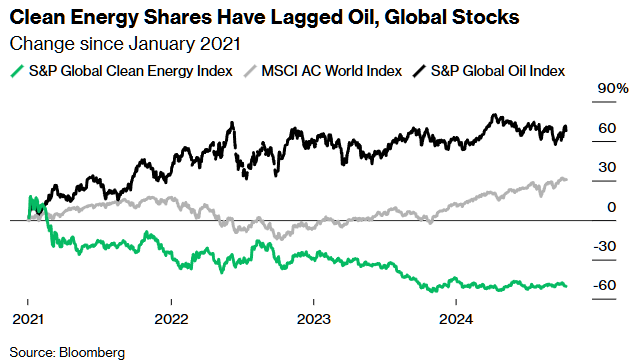🛰️ Europa Clipper's Epic Quest, 💻 TSMC's AI Chip Boom, and 💲 Crypto Chatbot's $500k Win
Thomas's Innovation Wrap #100
Greetings,
Here’s your weekly wrap of technology, innovation, and finance news.
🛰️ Space
NASA's Europa Clipper has launched on its $5.2 billion mission to explore Jupiter's icy moon Europa, our solar system's prime candidate for extraterrestrial life. This 7,145-pound colossus, NASA's largest interplanetary spacecraft, will embark on a six-year, 1.8-billion-mile journey before conducting 49 flybys of Europa over four years from 2030.
"I often talk about these missions as modern cathedrals-they are generational quests," said Laurie Leshin, director of NASA's Jet Propulsion Laboratory.
Europa Clipper aims to confirm Europa's subsurface ocean and assess its habitability using nine instruments. The mission overcame a last-minute hurdle when engineers discovered vulnerabilities in radiation-hardened circuits, devising an ingenious heating solution to repair radiation damage.
"I was devastated," Evans says, recalling that day in May. "It was hard to imagine a path forward. But then you take a step back, and you start to methodically think through things."
Meanwhile, India's private space sector is gaining momentum, with companies like Skyroot Aerospace developing innovative rockets and Pixxel advancing satellite imaging, positioning India as an emerging player in the global space economy.
💻 Chips and Computing
TSMC reporting a 54% jump in quarterly profit. CEO C.C. Wei declared "the demand is real" as TSMC forecasts AI chip revenue to more than triple in 2024, projecting nearly 30% overall revenue growth.
"One of my key customers said the [AI] demand right now is insane," C.C. Wei, TSMC chairman and CEO, told investors on Thursday. "The demand is real. I believe it's just the beginning of this demand ... and it will continue for many years."
TSMC is also expanding its reach, planning additional chip plants in Europe beyond its €10 billion Dresden fab.
"They [TSMC] have started construction of the first fab in Dresden, they are already planning the next few fabs in the future for different market sectors as well," Cheng-wen told Bloomberg TV in a Monday interview.
Photonic computing startup Lightmatter raised $400 million to revolutionise datacentre interconnects. Their optical interconnect layer promises to dramatically improve GPU synchronisation, potentially solving a major AI computing bottleneck.
"Photonics is coming way faster than people thought — people have been struggling to get it working for years, but we're there," said Harris. "After seven years of absolutely murderous grind," he added.
💲 Finance
Taiwan is experiencing its largest fundraising boom since 2007, with chipmakers and hardware manufacturers driving the surge to meet growing demand for AI components.
"There will be more capital needs from Taiwanese companies, especially among tech companies, in the next two to three years," said Jennifer Pu, an Asia equity capital markets managing director who covers Taiwan at Citigroup Inc. The urgency to secure chips amid tight supply will continue to power the fundraising wave, she added.
Horizon Robotics, a Chinese provider of software and hardware for autonomous driving systems, is planning an $800 million IPO. They have attracted Alibaba and Baidu as cornerstone investors.
Alibaba, Baidu and other Chinese tech firms have accelerated investment into cutting-edge industries that Beijing deems to be strategic, such as autonomous driving, chips and artificial intelligence. Baidu in particular is making a big bet on driverless cars and robotaxis, to complement a push into generative AI.
Schneider Electric invested $850 million to buy a 75% stake in Motivair Corporation, a specialist in liquid cooling for high-performance computing systems. The deal positions Schneider to capitalise on growing cooling demands from AI-driven data centres, where traditional air cooling struggles to manage the heat generated by dense server environments.
"This shift to accelerated computing is resulting in new datacenter architectures requiring more efficient cooling solutions, particularly liquid cooling, as traditional air cooling alone cannot mitigate the higher heat generated as a result," Schneider said.
Hedge funds are cooling on the green transition. More funds are net short on batteries, solar, and EVs than long, while fossil fuel positions remain predominantly long. This shift is attributed to underperforming green stocks, geopolitical tensions, and concerns about returns on climate investments.
“Geopolitics is the key reason why the energy transition theme isn’t working out,” says Kerry Goh, CEO of Kamet Capital Partners Pte., which oversees more than $1 billion from its base in Singapore. “China commands a dominant position in most of these sectors, and tariffs are spoiling the investment case.”
☢️ Nuclear
The nuclear energy trend continues, with Google partnering with Kairos Power and Amazon investing in X-Energy for small modular reactors (SMRs). Both companies aim to bring these next-generation reactors online in 2030 to power their growing AI operations.
NuScale Power received a stock price target boost from Craig-Hallum, citing a "nuclear power renaissance" and NuScale's position in the emerging "nuclear/SMR adoption" paradigm shift. NuScale Power stock role 39% last week.
Oklo, the nuclear company backed by OpenAI CEO Sam Altman, saw its stock double last week.
🔬 Biology
In de-extinction news, Colossal Biosciences claims to have sequenced 99.9% of the extinct thylacine's genome. The thylacine, also known as the Tasmanian tiger, went extinct in 1936. What caused this breakthrough? A preserved century-old thylacine head found in a Melbourne museum cupboard.
"It was literally a head in a bucket of ethanol in the back of a cupboard that had just been dumped there with all the skin removed, and been sitting there for about 110 years," Prof Andrew Pask, the head of the thylacine integrated genetic restoration research (with the acronym Tigrr) lab at the University of Melbourne, says.
📶 Wireless
Researchers have achieved a data transmission speed of 938 gigabits per second - over 9000 times faster than average 5G.
Splitting the signals across wide frequency ranges is like taking the "narrow, congested road" of current 5G networks and turning it into "10 carriage motorways", says Liu.
While 5G is still rolling out, the race for 6G supremacy is already heating up globally. The European Union is partnering with Taiwan to develop open, secure 6G global standards, a strategic move to counter China's growing influence in telecom infrastructure.
💎 Artificial Intelligence
In software development, generative AI is making progress but hasn't reached its full potential. A MIT Technology Review Insights survey found that while 94% of respondents use generative AI for development, only 12% say it has fundamentally changed their process. However, 38% believe it will substantially change software development across most organisations within three years.
Amazon is expanding its AI capabilities with AI-generated audio ads.
"With audio added to the lineup, we offer a full suite of tools that can generate images, videos and audio from little more than the information on a product's detail page," Jay Richman, vice president of creative experiences for Amazon, told ADWEEK.
Researchers at the University of Zurich have employed GPT-4 to detect antimicrobial resistance, potentially accelerating the identification of antibiotic-resistant bacteria.
"Antibiotic resistance is a growing threat worldwide, and we urgently need faster, more reliable tools to detect it," says Egli, who led the study. "Our research is the first step toward using AI in routine diagnostics to help doctors identify resistant bacteria more quickly."
Meta is open-sourcing a massive materials science dataset, containing 110 million data points to accelerate AI-driven materials discovery.
Zitnick says the newOMat24 model will top the Matbench Discovery leaderboard, which ranks the best machine-learning models for materials science. Its data set will also be one of the biggest available.
“Materials science is having a machine-learning revolution,” says Shyue Ping Ong, a professor of nanoengineering at the University of California, San Diego, who was not involved in the project.
🔗 Blockchain and Crypto
Found this amusing: An AI chatbot named Truth Terminal has turned $20,000 into over $500,000 via a Solana-based memecoin called GOAT. The saga began when Marc Andreessen gave the bot $50,000 in Bitcoin for "independent AI research," leading to a surreal series of events involving AI-generated religions and a growing cult following.
New Zealander Andy Ayrey, Truth Terminal's creator, does have personal control over the bot and actively modifies its code, so its not entirely autonomous.
From that idea, "Terminal of Truths" (also Ayrey's creation) was spawned. It's a combination of a couple of things, but for all intents and purposes, it's a semi-autonomous AI that can do things online, and talk to the world via its X account, @truth_terminal (tweets, however, are monitored and approved by Ayrey).
Terminal of Truths posts mostly nonsense. Sometimes it's funny, sometimes offensive; often, it sounds prophetic.
On a more traditional front, Hong Kong is embracing digital tokens to modernise its financial sector. The Hong Kong Monetary Authority's Project Ensemble Sandbox aims to streamline transactions of traditional assets through tokenisation.
"Tokenization has the potential to make financial transactions more efficient, more transparent and less costly," said Eddie Yue, the HKMA's chief executive.
📱 Devices
Bluesky, a Twitter-like social network, soared to the fifth spot in the US App Store rankings following X's controversial announcement that they plan to change how the block function works. Previously, if you blocked a user, they could no longer see your public posts, whereas soon they will be able to. Stalkers everywhere rejoiced.
The X alternative gained 500,000 new users in 24 hours, though I'm sceptical about how long it lasts. It is pretty hard to win against those X network effects.
"First day here," one Bluesky user wrote. "Was a longtime Twitter user but it's a shell of what it used to be."
Amazon accidentally unveiled the Kindle Colorsoft, their first colour e-reader, priced at $279.99.
The most interesting among the new devices is the Kindle Colorsoft Signature Edition, the company's first Kindle that supports color. That means you'll get colorful book covers, nicer images, and text highlighting in different colors.
For the chatty pet owner, there's now a $495 talking pet collar. The collar, called Shazam, uses a microphone and voice box to create the illusion of a conversation with your pet. It measures various inputs about the human, pet, and environment, feeding them into a "cognitive cortex" based on machine learning. The system requires a subscription for full functionality, with fees ranging from $195 to $295 per year after the first year.
Chatbot is perhaps not quite the right term. But rather than using a synthesized voice created with an AI like from the service Eleven Labs, all of Shazam’s voice lines will be prerecorded. There are 27 characters to choose from, each with its own personality and each played by a human voice actor.
Northwestern University engineers have developed MobilePoser, an app for real-time, full-body motion capture using just a smartphone. Unlike traditional motion capture systems that require specialised equipment or stationary cameras, MobilePoser uses sensors already embedded in consumer devices like smartphones and smartwatches. It combines sensor data with machine learning and physics-based optimisation to track a person's full-body pose and movement in space with a tracking error of just 8-10cm.
"Running in real time on mobile devices, MobilePoser achieves state-of-the-art accuracy through advanced machine learning and physics-based optimization, unlocking new possibilities in gaming, fitness and indoor navigation without needing specialized equipment," said Northwestern's Karan Ahuja, who led the study.
🛍️ Ecommerce
Google is enhancing its Shopping tab with AI, offering personalised recommendations and shopping advice. The tech giant is also rolling out a TikTok-style scrollable feed of shoppable products.
Google says it paired the 45 billion product listings in Google's Shopping Graph with Gemini models to transform the Shopping tab.
TikTok is connecting influencers with manufacturers to develop custom products for TikTok Shop. This seems like a smart way to increase the monetisation potential of TikTok influencers along with TikTok's cut.
Building personalized products is a top focus among creators and celebrities who attract a large enough audience to market and sell their own goods. While making sponsored content for an outside brand can be lucrative, it often means a short-term payday. Building a product line they own can give creators bigger payouts.
Electronic Shelf Labels (ESLs) are gaining traction in brick-and-mortar retailers. Walmart plans to install up to 500 million ESL units across its U.S. stores over the next three years, while Taiwan's Simple Mart is rolling them out across 800+ stores.
Early estimates show that each store can save more than one hour of labor per day, allowing employees to focus on providing more personalized services to customers.
CNBC profiled the billion-dollar pop-up store Spirit Halloween in this 11-minute segment. The company creates 1,500 temporary stores each year to capitalise on the spooky season.
⚡ Other Snippets
Nevada will host the world's first lithium-sulfur battery gigafactory, with Lyten investing over $1 billion to produce batteries 40% lighter than traditional lithium-ion cells.
Lyten's CEO, Dan Cook, called the Nevada gigafactory a significant milestone for the company, describing lithium-sulfur as a "leap in battery technology."
In China, humanoid robots are addressing manufacturing labour shortages, with UBTech's Walker S1 receiving over 500 orders from carmakers.
The Ministry of Human Resources and Social Security predicted in 2017 that major manufacturing industries, including automobiles, would face a shortage of 30 million workers by 2025.
Lastly, Elon Musk has cracked the top 30 on the Diablo 4 Season 6 Pit Leaderboard. The Pit is an intense time-trial dungeon where players must rapidly defeat hordes of monsters before confronting a final boss. Apparently, running multiple companies while catching rockets and unveiling new products still leaves plenty of time for demon-slaying.
Have a great week,
Thomas
About Thomas Rice
Thomas Rice co-founded Minotaur Capital, a technology-driven, AI-led global equities fund, and is based in Sydney, Australia. He can be found on the X at @thomasrice_au.





